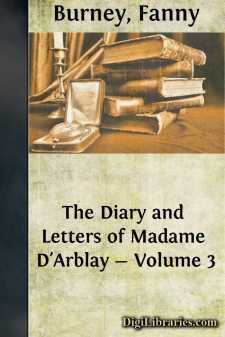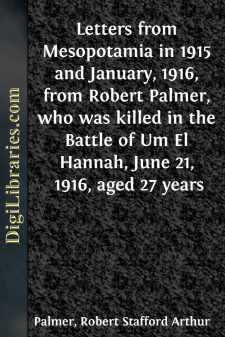Biography & Autobiography
- Adventurers & Explorers 15
- Artists, Architects, Photographers 16
- Business 2
- Composers & Musicians 14
- Criminals & Outlaws 5
- Editors, Journalists, Publishers 6
- Educators 1
- Entertainment & Performing Arts 3
- General 73
- Health, Exercise & Fitness 1
- Historians 3
- Historical 83
- Law Enforcement 1
- Lawyers & Judges 3
- Literary 147
- Medical 7
- Military 48
- Naturalists, Gardeners, Environmentalists 8
- Personal Memoirs & Diaries
- Philosophers 3
- Political 9
- Presidents & Heads of State 38
- Religious 38
- Rich & Famous 27
- Scientists 13
- Women 31
Personal Memoirs & Diaries Books
Sort by:
by:
Fanny Burney
THE FRENCH POLITICAL EMIGRANTS: MISS BURNEY MARRIES M. D'ARBLAY. [The following section must be pronounced, from the historical point of view, one of the most valuable in the " Diary." It gives us authentic glimpses of some of the actors in that great Revolution, "the Death-Birth of a new order," which was getting itself transacted, with such terrible accompaniments, across the...
more...
CHAPTER I MAC BECOMES A TROOPER A winter storm raged across the ridges and tore in violent gusts down the gullies, carrying great squalls of fleecy snow. The wind swept the flakes horizontally through the gap where the station track ran an irregular course through the bush; and, though but a short hour had passed since the ominous mass of black cloud had swept over the early morning sky, the ground was...
more...
by:
Mynors Bright
DIARY OF SAMUEL PEPYS. FEBRUARY & MARCH 1668-1669 February 1st. Up, and by water from the Tower to White Hall, the first time that I have gone to that end of the town by water, for two or three months, I think, since I kept a...
more...
To his Mother. It has been extremely wet since I last wrote. On Saturday we could do nothing except laze indoors and play billiards and Friday was the same, with a dull dinner-party at the end of it. It was very nice and cool though, and I enjoyed those two days as much as any. On Sunday we left Government House in order to be with Guy Coles during his three days' leave. It rained all the morning:...
more...
CHAPTER I ANTWERP On September 20th, 1914, I left London for Antwerp. At the station I found I had forgotten my passport and Mary had to tear back for it. Great perturbation, but kept this dark from the rest of the staff, for they are all rather serious and I am head of the orderlies. We got under way at 4 a.m. next morning. All instantly began to be sick. I think I was the worst and alarmed everybody...
more...
by:
Anonymous
INTRODUCTION I have been asked to write an Introduction to these letters; and I do so, in spite of the fact that M. Chevrillon has already written one, because they are stranger to me, an Englishman, than they could be to him a Frenchman; and it seems worth while to warn other English readers of this strangeness. But I would warn them of it only by way of a recommendation. We all hope that after the...
more...
CHAPTER I Toward the end of the summer of 1917 it was very hot in New York, and hotter still aboard the transatlantic liner thrust between the piers. One glance at our cabins, at the crowded decks and dining-room, at the little writing-room above, where the ink had congealed in the ink-wells, sufficed to bring home to us that the days of luxurious sea travel, of a la carte restaurants, and Louis Seize...
more...
by:
Frederick Palmer
I"Le Brave Belge!" The rush from Monterey, in Mexico, when a telegram said that general European war was inevitable; the run and jump on board the Lusitania at New York the night that war was declared by England against Germany; the Atlantic passage on the liner of ineffaceable memory, a suspense broken by fragments of war news by wireless; the arrival in England before the war was a week old;...
more...
by:
Mynors Bright
DIARY OF SAMUEL PEPYS. JUNE & JULY 1664 June 1st. Up, having lain long, going to bed very late after the ending of my accounts. Being up Mr. Hollyard came to me, and to my great sorrow, after his great assuring me that I...
more...
CHAPTER I. MY BIRTH AND PARENTAGE—EARLY TASTES AND TRAVELS—MARRIAGE, AND WIDOWHOOD. I was born in the town of Kingston, in the island of Jamaica, some time in the present century. As a female, and a widow, I may be well excused giving the precise date of this important event. But I do not mind confessing that the century and myself were both young together, and that we have grown side by side into...
more...











